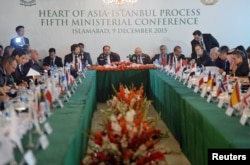Peace talks between the Afghan government and Taliban are likely to resume as early as next week, Pakistani officials said Wednesday.
“An internationally guaranteed and monitored peace process is likely to get underway next week,” the officials told VOA, requesting anonymity.
They added Pakistan wants an international presence in the entire process because of the long history of mistrust and suspicions between Pakistan and Afghanistan.
The development stemmed from a string of bilateral, trilateral and quadrilateral meetings in Islamabad involving Pakistani Prime Minister Nawaz Sharif, Afghan President Ashraf Ghani, and top American and Chinese officials.
The discussions took place on the sidelines of an annual regional conference on Afghanistan.
The U.S. State Department on Wednesday said the peace talks should be an Afghan-led process, without confirming peace talks could resume as early as next week.
"What we want to see is an Afghan-led reconciliation process that leads to a more safe and more secure Afghanistan," said spokesperson John Kirby.
He said the Afghan government has made reforms and progress toward defending its citizens, but the Taliban still remains a threat, noting a deadly Taliban attack Tuesday at Kandahar airport.
'Positive' discussions
On Wednesday night, Pakistan's military chief General Raheel Sharif held a meeting with Ghani to discuss a possible timeframe for "reinvigorating" the Afghan peace process.
Official sources with knowledge of the meeting told VOA it was "extremely positive" but refused to discuss the details.
"We have agreed to reinvigorate the process and start it from where it stopped. We will take meaningful steps to make the gains irreversible," the sources said without elaborating.
The officials told VOA that Pakistan "laid out both its leverage and limitations" with factions of the Afghan insurgency and assured all participants Islamabad "will do whatever it can to bring at least those to the [negotiating] table who are under its influence."
Taliban engagement
Speaking at a news conference after the meetings, Afghan Foreign Minister Salahuddin Rabbani confirmed an understanding has been reached on starting the reconciliation talks with the Taliban.
The minister said all stakeholders agreed “the surest way” to peace and stability in Afghanistan is through negotiations.
“… our allies, in this case U.S. and China and of course Pakistan, have expressed their willingness to work with Afghanistan on peace and reconciliation process. And we very much hope that his effort will result in a result-oriented peace process where we will see some positive moves in the coming weeks … but we hope that this will start as soon as possible.”
The Afghan minister said there are no “new terms and conditions” from the government for starting peace talks with the Taliban, adding both sides can discuss it once the process begins.
“We will welcome all those opposition elements who renounce violence, accept Afghanistan’s constitution, disarm and join the reconciliation process,” Rabbani added.
There is no immediate reaction from the Taliban about its participation in the peace talks.
When asked whether Kabul trusts Islamabad’s commitment to help promote the Afghan peace, Rabbani said the Pakistani leadership at the meetings reassured that peace in Afghanistan is vital for stability in their own country and “we hope they will sincerely and honestly” cooperate with Afghanistan to make the reconciliation “result-oriented”.
Pakistani officials described the agreement to resume Afghan peace talks as a major step and expected a lot of work and consultations before the peace negotiations, without disclosing their location.
A peace dialogue brokered by Pakistan broke down in July after it was revealed that Taliban leader Mullah Omar had died two years ago — information Afghanistan accused Pakistan and the Taliban of hiding.
Curbing conflict
Larry Sampler, the U.S. representative at the talks, called reconciliation the "surest way of achieving an end to the conflict in Afghanistan.
“Recognizing the inherent challenges of starting such a process we should proceed with all deliberate speed towards reconciliation talks.”
Previous efforts to cooperate on an Afghan peace process have failed, in part because of mistrust between the two governments. Many Afghan officials believe Pakistan continues to secretly back the Afghan Taliban, despite denials from Islamabad.
Ghani emphasized the need for the two countries to cooperate politically, militarily and economically to create lasting peace.
Ghani also appeared to suggest the two countries should allow a third party to help facilitate their cooperation in an effort to help build trust, but he gave few specifics.
“... a mechanism of regional cooperation and seeing how the networks of terror coordinate, who finances them, what is their linkage with the criminal economy, the blood economy, particularly with the rest of the criminal economy,” said Ghani.
He said he also hoped the next year would be better than 2015 — a year in which he said Afghanistan has been fighting for its survival.





